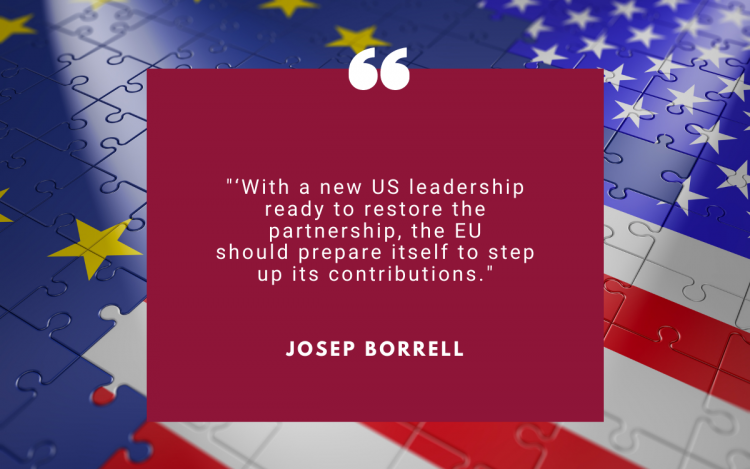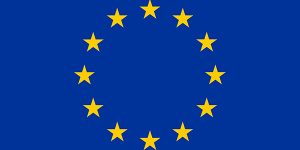09/11/2020 – HR/VP Blog – The victory of Joe Biden as the President-elect has been warmly welcomed in Europe. Now we need to seize the opportunities this offers to rebuild EU-US cooperation. With a new US leadership ready to restore the partnership, the EU should prepare itself to step up its contributions. The world needs a US ready to listen and a Europe able to act.
Great scenes of celebration in the United States have marked the election victory of Joe Biden and Kamala Harris. This is not surprising as these were no ‘normal elections’. There was a lot at stake, for the country, its role and standing in the world, and even for the fate of democratic politics worldwide. For four days, people held their breath as the votes were counted in a very narrow race. Like so many millions around the world, I followed the latest news, hour by hour.
This tells you something about the unique role of the US. It is a very powerful country but it also embodies a powerful narrative: a democratic republic founded by immigrants escaping prosecution and those searching a better life. Despite enormous societal challenges and divisions at home, one of America’s strongest qualities has been its capacity of democratic renewal. And that is precisely what we have seen unfold this past week: the system worked.
It is standard diplomatic practice to avoid expressions of political preference. However, according to opinion polls, many Europeans welcome that the majority of Americans have voted for change. It is no secret that the past four years have been complicated in terms of EU-US relations. They were marked by numerous policy disagreements. And we even saw some of the principles that we considered as the bedrock of the transatlantic partnership being eroded, and sometimes even emptied of their substance.
President-elect Biden has clearly stated his commitment to restore unity and respect for democratic norms and institutions, at home and abroad. This is as welcome as his assurances to work with allies based on true partnership. For the EU, the US is our most important ally and partner and we believe the same is true in reverse. We have a long history of working together based on shared values. So, we welcome the chance to work once again with a US President who doesn’t consider us a ‘foe’ or believes the EU has been ‘set up to take advantage of the US’.
We are ready to do our part to improve cooperation. To restore EU-US cooperation, we need to kick-start the ‘engine’. More specifically, we need to get back to real dialogue, establish again a commitment to formulate joint strategies wherever possible and be willing to put resources behind them.
The one thing we should avoid is a sterile debate, premised on a false choice: whether we go either ‘Transatlantic’ or ‘European’. For me, investing in a strong and capable Europe also means investing in a revitalised transatlantic partnership. With a Biden administration, the two are flip-sides of the same coin.
There are many areas where EU-US cooperation has to be very close. We can already welcome the stated intention of the President-elect to re-join key multilateral efforts such as the Paris Agreement on climate change, the Iran nuclear deal, and the World Health Organization. The same goes for his stated intention to pursue a constructive stance on bilateral trade issues, but also in the World Trade Organization including the all-important dispute settlement system. In each of these areas, Europe should support and facilitate a smooth ‘return to the table’ and use it as a springboard for joint action.
We can also foresee an interest by the incoming Biden administration for close cooperation on China and the challenges it poses in terms of unfair trade practices, security and other issues where we both have concerns. Formulating a coherent and robust China stance is at the top of the agenda in Washington and something on which there is bipartisan agreement. We are ready for that and we can expect the EU-US dialogue on China that we launched only last month to continue, with renewed energy, under the next administration.
A capable and strategically aware Europe is the best partner for the US – and also what Europe itself needs.
When it comes to NATO and the transatlantic security ‘bargain’, we hope to count on the new President to be solid in its commitment to the Alliance, as per his decade-long track record. However, as many US administrations have stressed, this will be coupled with an emphasis on Europe needing to up its game and take more responsibility for its own security. A European Common Security and Defence Policy that is adequately resourced and geared towards enabling Europe to tackle security threats especially in our neighbourhood will be welcomed by the US. This is also very much in our own interest.
In essence, a capable and strategically aware Europe is the best partner for the US – and also what Europe itself needs. It is for this reason that we have to proceed with our work to enhance Europe’s strategic autonomy, i.e. its ability to act and defend itself effectively on its own. The last four years have opened our eyes and COVID-19 has further accentuated the need to look after our security and address other vulnerabilities, under the banner of strengthening our strategic autonomy.
There are many more areas where the EU and US have an interest in working together in foreign policy: Russia and the Eastern neighbourhood, Libya and the MENA region, the Balkans and Turkey/Eastern Mediterranean. But also, further afield: from Afghanistan; to the South and East China seas; to Venezuela and beyond. Plus the not-so-new challenges like hybrid threats, disinformation or the security aspects of Artificial Intelligence and 5G. The list is long, growing and the needs are becoming urgent.
In the coming days and weeks, we as EU will reach out to the incoming administration to see how we can best work together. We should of course be mindful that their first priority will be internal, to handle the pandemic, plus the economic consequences and to heal the country’s enormous divisions. To illustrate the latter point: at the time of writing there has still been no concession speech by President Trump. In any event, President-elect Biden may have to work with a Republican controlled Senate . This would have an impact on his freedom of manoeuvre, especially in foreign policy.
The bottom line is this: I welcome that the US will have a new leadership elected on a platform of change and a desire to work with democratic allies. While our American partners focus on the transition, we should focus on what the EU expects and on what it can offer. EU leaders and Foreign Ministers will discuss how we can make the most of the new chapter that is now opening up. Let’s get to work.




